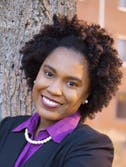Doctoral student receives minority fellowship from NBCC Foundation
Raven Cokley, a doctoral student in the department of counseling and human development services, was recently awarded a federally-funded minority doctoral fellowship from the National Board for Certified Counselors (NBCC) Foundation.

NBCC is the premier credentialing body for counselors who have achieved the highest standard of practice through education, examination, supervision and experience. The foundation's goal is to increase the number of culturally competent addiction counselors and mental health counselors available to minority populations, with a specific focus on transition-age youth.
"With the support of the NBCC Minority Doctoral Fellowship, I will not have to worry about securing additional funding to cover my tuition and fees next year," said Cokley, who is pursuing a doctoral degree in counseling and student personnel services. "I am truly grateful to NBCC for helping to alleviate that financial stress and anxiety for me."
As an NBCC Minority Doctoral Fellow, Cokley will receive training via webinars and conference presentations and professional coaching and guidance from practitioners in the counseling field. Additionally, the fellowship will allow her to focus on sharing her research and scholarship with other students and community members.
As a first-generation doctoral student, Cokley's research focuses on the educational experiences of high-achieving black girls and women from lower-income families. She also studies the experiences of first-generation doctoral students and the roles of counselors and counselor educators in the Black Lives Matter movement.
"It is imperative that we increase the number of culturally-conscious counselors serving underrepresented populations because without doing so, we perpetuate white supremacy in our practices and pedagogies," said Cokley. "Increasing the number of cultural-conscious counselors disrupts this pattern of systemic injustice and calls for transformative and liberatory practices within the field."
After earning her PhD, Cokley hopes to continue researching and teaching students as a faculty member. She also plans to practice as a consultant in secondary school settings.